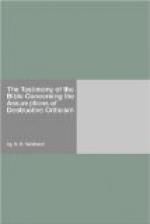We are asked to believe that the author of this fifty-third chapter, the most minute and tender prophecy concerning the Messiah’s sufferings for his people, and rejection by them, has dropped out of sight! We are asked to believe that the name of the prophet who gave this dramatic picture of what was to take place on Calvary seven hundred years later, has been lost in the fog of the passing centuries! We are asked to believe that the name of the author of the first thirty-nine chapters, the less important part of the book, has been preserved, but oblivion has overtaken the author of the book from the fortieth chapter to the end.
The assumption is an affront to the intelligence of the ordinary reader of the Bible. It is an impeachment of the honesty of the authors of the gospels, which the unshaken faith of God’s people can never concede.
The reader can now sum up the testimony of Matthew, Mark (see i. 3, R.V.), Luke, John, and John the Baptist, all of whom with one voice contradicts the critics. We also prefer, with these witnesses, to discredit the men who are picking out clauses, verses and chapters here and there, and guessing them off to authors of their own invention, who have never been known or heard of.
It is not sufficient for the critics to say that these New Testament authors knew better, but deferred to popular sentiment, based on tradition. That can not satisfy our estimate of them as God’s divinely appointed teachers, chosen to make record of the momentous truth on which the salvation of a lost world hangs. Men, ready to lay down their lives for the truth, were not the men to play fast and loose with the Word of God, in deference to a supposed popular sentiment.
Further, our critical friends have assumed to decide for the prophets that they must prophesy out of their immediate surroundings in such a marked way, with such continued reference to the events of the period, that the prophecy must be located in that period. If the critic cannot find these particular local earmarks, he must push the prophecy to a point of time with which he can make it synchronize, and which will satisfy his literary judgment. By this law of determining dates, the critics claim that the book of Isaiah is a composite work, produced by different authors and at different times.
On this assumption the latter part of the book of Revelation was not a revelation to the Apostle John on the Isle of Patmos. The first part of the book may be adjudged as his. But presently the matter of the book passes into a realm beyond the time and circumstances that belong to that period, hence may not claim him as its author. An assumption that sets aside the claims of Scripture, as to authorship, in order to harmonize the book with one’s literary and critical judgment, may be dismissed on its own lack of merit.
The proposed law above referred to, as a method of locating prophecy as to time, or determining the author, is arbitrary, and an absurd attempt to destroy all the testimony of inspired writers, who have settled the question of authorship and the date of prophecy.




